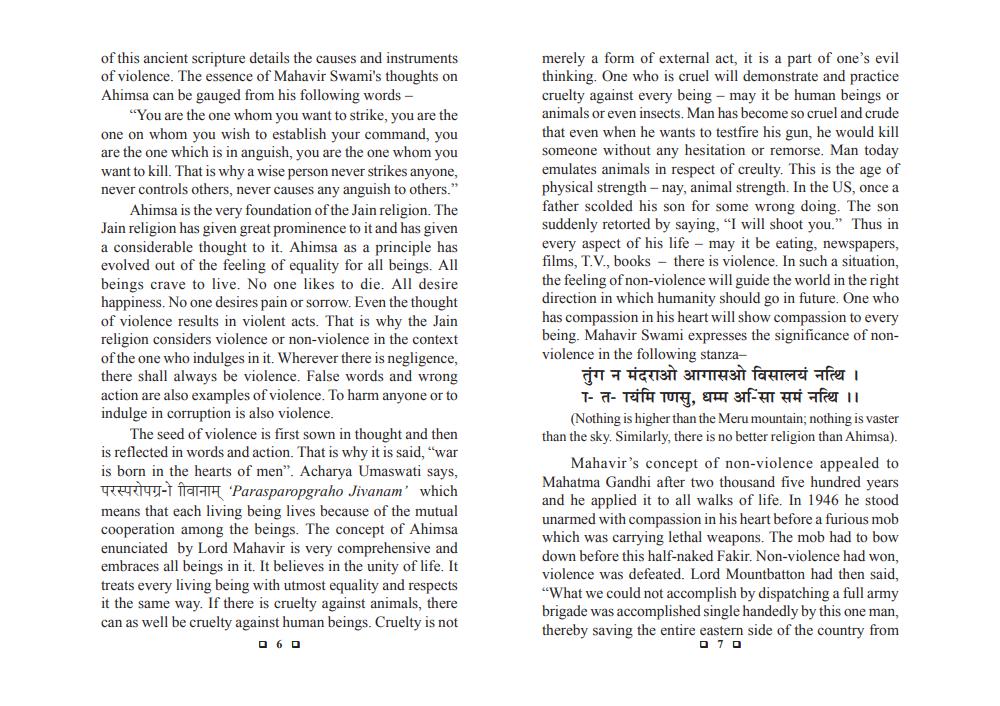Book Title: Our Life In The Context of Five Anuvrat And Anekantwad Author(s): Kumarpal Desai Publisher: Jaibhikkhu Sahitya Trust View full book textPage 6
________________ of this ancient scripture details the causes and instruments of violence. The essence of Mahavir Swami's thoughts on Ahimsa can be gauged from his following words - "You are the one whom you want to strike, you are the one on whom you wish to establish your command, you are the one which is in anguish, you are the one whom you want to kill. That is why a wise person never strikes anyone, never controls others, never causes any anguish to others." Ahimsa is the very foundation of the Jain religion. The Jain religion has given great prominence to it and has given a considerable thought to it. Ahimsa as a principle has evolved out of the feeling of equality for all beings. All beings crave to live. No one likes to die. All desire happiness. No one desires pain or sorrow. Even the thought of violence results in violent acts. That is why the Jain religion considers violence or non-violence in the context of the one who indulges in it. Wherever there is negligence, there shall always be violence. False words and wrong action are also examples of violence. To harm anyone or to indulge in corruption is also violence. The seed of violence is first sown in thought and then is reflected in words and action. That is why it is said, "war is born in the hearts of men". Acharya Umaswati says, परस्परोपन- ीिवानाम् 'Parasparopgraho Jivanam' which means that each living being lives because of the mutual cooperation among the beings. The concept of Ahimsa enunciated by Lord Mahavir is very comprehensive and embraces all beings in it. It believes in the unity of life. It treats every living being with utmost equality and respects it the same way. If there is cruelty against animals, there can as well be cruelty against human beings. Cruelty is not 60 merely a form of external act, it is a part of one's evil thinking. One who is cruel will demonstrate and practice cruelty against every being - may it be human beings or animals or even insects. Man has become so cruel and crude that even when he wants to testfire his gun, he would kill someone without any hesitation or remorse. Man today emulates animals in respect of creulty. This is the age of physical strength - nay, animal strength. In the US, once a father scolded his son for some wrong doing. The son suddenly retorted by saying, "I will shoot you." Thus in every aspect of his life - may it be eating, newspapers, films, T.V., books - there is violence. In such a situation, the feeling of non-violence will guide the world in the right direction in which humanity should go in future. One who has compassion in his heart will show compassion to every being. Mahavir Swami expresses the significance of nonviolence in the following stanza तुंग न मंदराओ आगासओ विसालयं नस्थि । T- - Taifa Tury, CT sf- fer 11 (Nothing is higher than the Meru mountain, nothing is vaster than the sky. Similarly, there is no better religion than Ahimsa). Mahavir's concept of non-violence appealed to Mahatma Gandhi after two thousand five hundred years and he applied it to all walks of life. In 1946 he stood unarmed with compassion in his heart before a furious mob which was carrying lethal weapons. The mob had to bow down before this half-naked Fakir. Non-violence had won, violence was defeated. Lord Mountbatton had then said, “What we could not accomplish by dispatching a full army brigade was accomplished single handedly by this one man, thereby saving the entire eastern side of the country from O 7Page Navigation
1 ... 4 5 6 7 8 9 10 11
